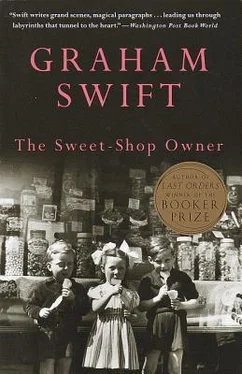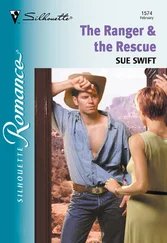Graham Swift - The Sweet-Shop Owner
Здесь есть возможность читать онлайн «Graham Swift - The Sweet-Shop Owner» весь текст электронной книги совершенно бесплатно (целиком полную версию без сокращений). В некоторых случаях можно слушать аудио, скачать через торрент в формате fb2 и присутствует краткое содержание. Год выпуска: 2012, Издательство: Vintage Books USA, Жанр: Современная проза, на английском языке. Описание произведения, (предисловие) а так же отзывы посетителей доступны на портале библиотеки ЛибКат.
- Название:The Sweet-Shop Owner
- Автор:
- Издательство:Vintage Books USA
- Жанр:
- Год:2012
- ISBN:нет данных
- Рейтинг книги:4 / 5. Голосов: 1
-
Избранное:Добавить в избранное
- Отзывы:
-
Ваша оценка:
- 80
- 1
- 2
- 3
- 4
- 5
The Sweet-Shop Owner: краткое содержание, описание и аннотация
Предлагаем к чтению аннотацию, описание, краткое содержание или предисловие (зависит от того, что написал сам автор книги «The Sweet-Shop Owner»). Если вы не нашли необходимую информацию о книге — напишите в комментариях, мы постараемся отыскать её.
The Sweet-Shop Owner — читать онлайн бесплатно полную книгу (весь текст) целиком
Ниже представлен текст книги, разбитый по страницам. Система сохранения места последней прочитанной страницы, позволяет с удобством читать онлайн бесплатно книгу «The Sweet-Shop Owner», без необходимости каждый раз заново искать на чём Вы остановились. Поставьте закладку, и сможете в любой момент перейти на страницу, на которой закончили чтение.
Интервал:
Закладка:
Up that slide, Dorry — there where the kids are playing. When she said, ‘Why don’t you?’ I did, I obeyed. I clambered up that slide and slid down.
Mrs Cooper wiped her glasses. There hadn’t been a customer for nearly a quarter of an hour. Three o’clock. The mid-afternoon lull. She sat by the till. Her glasses were misty. Where was he? Half way up the Common Road? In Russell Street? Gasping, straining his poor heart. Mr Chapman — she’d do anything, anything. She rested her elbow on the counter and propped her cheek in her palm. No customers; the shop to herself. She rocked gently back and forth on two legs of her stool, crossing her legs one over the other — a slither of nylon — and feeling her shoe on her right foot, under the counter, hang just by the toes.
Sandra stood before the mirror in the changing cubicle. It was hot and oppressive down here in the basement of the shop. The electric lights, the music, the blow-ups of Mick Jagger and Paul Newman on the walls, put there to make it seem they were watching you undress. Two rows of cubicles with flimsy curtains. Though the thing was, of course, not to draw the curtains. She stood in her bra and briefs looking at herself. Yes, she was all right in the right places. She didn’t need a bra — she had a good mind to take it off and go back to the shop with only her T-shirt on, just to see that old bag’s eyes pop. She’d tried on the red dress. Yes, it looked great on her. She would buy it, with Mr Chapman’s money. But she paused, irresolutely, before the mirror. Just for a moment, it was as though some other person looked back at her, unreachable behind the glass.
Children’s playground. Grey spire of St Stephen’s. Dome of the Town Hall. Everything in its place. He put his left thumb in his breast pocket and touched the letter.
‘You will see in the end.’
Yes, well all right. Even though she never changed the will, most of that money should have been yours. I didn’t need it. But — don’t you see? I kept it because it was all I had that was hers. It was her price, my dues from the bargain. And I would only have kept it — not touched it. So that in the end, anyway –
And supposing I’d given you the money — with indecent promptness, after the funeral? ‘Here — it’s mine, but I don’t want it.’ You’d have gone off with it, for good — to him in Bristol. Don’t you see? I kept that money to keep you too.
So I wrote you that letter in August. She’d been dead only three weeks.
Dear Dorothy,
You know that Mother made clear in her will that no money of hers should be passed on by me to you, except through a will of my own. You know my feelings about it. You know had she ever discussed it I would have persuaded her against it. But out of respect for her wishes — out of respect for your dead mother — I think we must do what she wanted.
Where did I find those sanctimonious words? I should have added: ‘Out of respect for her wishes you ought to stay with me, be with me.’ You were her gift. And you wrote back — that was only a month after we cremated her — ‘What about the respect due to me?’
I waited for you to come. All through last winter. I thought: if you come back, what does the money matter? But only your demanding letters came. Were we really at war?
I waited through Christmas. I did all those things I’d done before — got up at five-fifteen, made my breakfast, sat at the table at night with my books on the green baize cloth — automatically and mechanically, as if she were still there. I touched nothing. The furniture, the china, her chair by the window. I said to Mrs Pritchard: Nothing must be changed. The same and not the same. And in the shop I felt my face, over the counter, go hard like a shell. I thought, this is what happens: you harden, you set in your mould. I worked on like a machine, counting the weekly takings I no longer needed. Though that was a winter of sudden thrift: power-cuts; no oil, no lights in the shop windows, a three-day week. And I saw on Hancock’s face as he came in for cigars a stony look like my own: it’s all over, that mad boom, now we can count the cost.
The cost? I had these pains in my side. I knew it was my heart. I went to Doctor Field’s. And then to the hospital, where they tested me and cardiographed me and entered little notes in files. How fragile we are. Doctor Field explained and prescribed tablets. They’re the same ones as my wife took, I said, and he said, Yes. Then he told me: ‘And you must take the pressure off. Perhaps it’s time you were thinking of giving up that shop of yours.’
Mrs Cooper said, ‘Well he’s right too. You could give it up now. Take a complete rest. I’d manage for you.’ She had the air of a hired nurse who has earned a share in her patient’s decisions. Along the High Street she was broad-casting, with her own embellishments, my story — our story, Dorry. ‘Went off and left him, she did. Only turned up for the funeral. Went off with some student — and him with a heart condition. Little bitch.’ Though I knew what she was thinking: ‘Poor, poor Mr Chapman — the old tight-wad.’ ‘Come, come and spend Christmas with me,’ she said, ‘You can’t spend it all on your own.’ And I knew I had to watch out.
I waited, Dorry. The money was only a token. I never meant us to fight.
33
He reached the Common Road, under the shade of the plane trees. The pain in his chest was like a tight breastplate. He paused for a moment by one of the peeling tree trunks, gathering his breath; removed his jacket and hooked it over his right shoulder. A ‘Mr Whippy’ van, pink and cream, with a jangling loudspeaker that played ‘Greensleeves’, had drawn up on the pavement. Hands reaching. Good weather for business.
He crossed over the road, breathing deeply, waiting for the gaps in the traffic, then turned up Russell Street.
I used to walk along this same road, Russell Street, on my way to school, with a briefcase in my hand then. For Mum and Dad said, now you’ve got to the grammar school you must have a briefcase, not a satchel like the ordinary kids. I used to get the tram from where we lived, which was not far from where Mrs Cooper’s flat is, down Allandale Road, then walk over the common. At four o’clock back again, less briskly, by the same route; though not before taking the detour, with the others, down Pond Street — to Mr Vincent’s shop.
If someone had said then: One day you will own that shop; one day you will walk along Russell Street with your briefcase containing wage-packets and order forms, I wouldn’t have been surprised. If someone had said, There, where you walk across the common, you will meet your future wife, there she will decide to marry you, I would have replied, All right, so be it. I didn’t believe, despite being at grammar school, that the future belonged to me. I thought: things would come to you anyway, and when they did they would already be turned into history.
Shady on this side of Russell Street. Gaunt Edwardian houses offsetting the new estate on the other side. Then the turning-off which, if you follow it, curves up past the old people’s home to St Stephen’s church. Then the brick wall — there are slogans on it in chalk and aerosol spray — ‘Russell Bootboys’, ‘Judy Freeman fucks coons’; ambitiously sketched bits of anatomy — which someone has tried to remove. Then the railings, the double row of chestnuts, their outer branches jutting over the railings and the pavement. Pause here. Breathe. The shade under chestnut trees is always dense and cool. They are one of the first trees to sprout in spring and to shed in the autumn. That was something I learnt at school, Dorry, by not paying attention; by looking from the window.
Читать дальшеИнтервал:
Закладка:
Похожие книги на «The Sweet-Shop Owner»
Представляем Вашему вниманию похожие книги на «The Sweet-Shop Owner» списком для выбора. Мы отобрали схожую по названию и смыслу литературу в надежде предоставить читателям больше вариантов отыскать новые, интересные, ещё непрочитанные произведения.
Обсуждение, отзывы о книге «The Sweet-Shop Owner» и просто собственные мнения читателей. Оставьте ваши комментарии, напишите, что Вы думаете о произведении, его смысле или главных героях. Укажите что конкретно понравилось, а что нет, и почему Вы так считаете.












